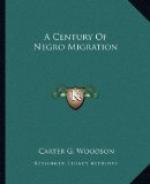Indian Territory,
exodus of Negroes to,
Indiana,
the attitude of, toward the Negro;
counties of, receiving Negroes from slave
states;
slavery question in the organization of;
effort to make constitution of pro-slavery;
race prejudice in;
protest against the settlement of Negroes
there,
Indians,
attitude of, toward the Negroes,
Infirmary Farms,
for refugees,
Intimidation,
a cause of migration,
Irish,
antagonistic to Negroes;
their hatred of Negroes,
Jamaica,
Negroes of the United States settled in,
Jay’s Treaty,
Jefferson, Thomas,
his plan for general education including
the slaves;
plan to colonize Negroes in the West;
natural rights theory of;
an advocate of the colonization of the
Negroes in the West Indies,
Jenkins, David,
a paper hanger and glazier,
Johnson, General,
permitted slave hunters to seek their
slaves in his lines,
Julius, John,
proprietor of a cafe in which he entertained
President William H.
Harrison,
Kansas Freedmen’s Relief Association,
the work of,
Kansas refugees,
condition of;
treatment of,
Kaokia,
slaves of,
Kaskaskia,
slaves of,
Keith, George,
interested in the Negroes,
Kentucky,
disfranchisement of Negroes in;
abolition society of, advocated the colonization
of the blacks in
the West,
Key, Francis S.,
a colonizationist,
Kingsley, Z.,
a master, settled his son of color in
Hayti,
Ku Klux Klan,
the work of,
Labor agents promoting the migration of Negroes,
Lambert, William,
interest of, in the colonization of Negroes,
Land tenure,
a cause of unrest;
after Reconstruction,
Langston, John M.,
returned from Ohio to Virginia,
Lawrence County, Ohio,
Negroes immigrated into,
Liberia,
freedmen sent to,
Lincoln, Abraham,
urged withholding slaves,
Louis XIV,
slave regulations of,
Louisiana,
drain of laborers to;
exodus from;
refugees in,
Lower Camps, Brown County,
Negroes of,
Lower Louisiana,
conditions of;
conditions of slaves in,
Lundy, Benjamin,
promoter of the migration of Negroes,
Lynching,
a cause of migration;
number of Negroes lynched,
McCook, General,
permitted slave hunters to seek their
Negroes in his lines,
Maryland,
disfranchisement of Negroes in;
passed laws against Negro mechanics;
reaction in,
Massachusetts,
exterminated slavery,
Meade, Bishop William,
a colonizationist,




